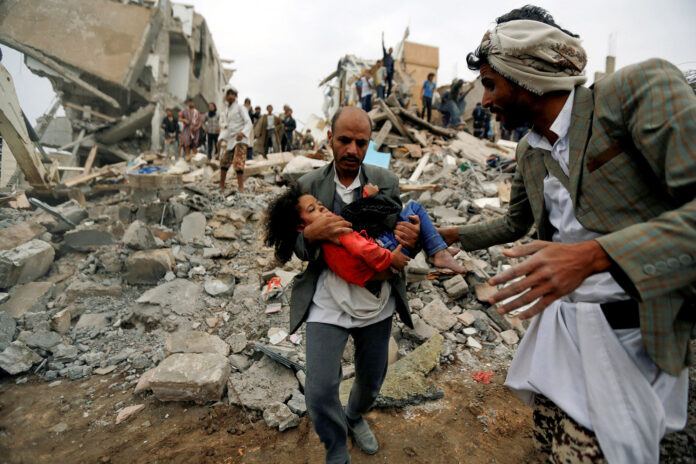
In the shadow of the mountains, on the narrow and crumbling streets of Taiz, Yemen, lies a world far removed from the attention of the global stage. Here, suffering takes root and thrives amidst an ongoing conflict that the world has conveniently forgotten.
Meet Bader al-Harbi, a brave seven-year-old boy with a mop of dark hair, who navigates the potholed streets nimbly, using crutches to support himself. Bader’s right leg was amputated above the knee, leaving him scarred and marked by the war that is almost as old as he is. His brother, Hashim, stands by his side, scarred both physically and emotionally, his right foot mangled and a thumb missing.
These young boys’ lives were forever altered one fateful October morning when Houthi shelling struck them as they returned home from school. Since then, they have been living in the shadows, unable to attend school due to financial constraints and the ever-present danger around them.
Taiz, once a vibrant city, now bears the marks of an unending civil war, fueled by regional rivalries. The conflict has pitted Saudi Arabia, supporting Yemen’s weak but internationally-recognized government, against Iran, backing the Houthi movement. The war, now in its ninth year, has torn the nation apart, with Taiz serving as one of its many battlegrounds.
Bader, Hashim, and countless other children in Taiz bear the brunt of this prolonged conflict. Shelling, mines, and unexploded ordnance have left over 100 child amputees in the city since 2015. Each house on al-Rasheed Street houses its own measure of fear, with families living in constant danger as Houthi gunmen lurk nearby.

In the midst of this violence, hunger stalks the children of Yemen like a relentless predator. Malnutrition has become an all-too-common companion, with nearly half a million Yemeni children under the age of five suffering from severe acute malnutrition. Families, like Rajah Mohammed’s, struggle to keep their children fed while their homes are continuously displaced by the war.
The war has left a trail of pain and loss for Umm Ahmed and her family. Displaced for seven years, she has buried four of her children due to malnutrition and liver problems, and now her youngest, Safaa, is dangerously malnourished. The suffering seems unending, as even medical clinics have been forced to close due to lack of funding and support from foreign aid agencies.
In the face of this immense suffering, Yemen finds itself pushed to the brink of fragmentation. Political and regional divisions complicate any attempts at peace, leaving children like Bader, Hashim, Amir, Awam, and Safaa in the crossfire of a conflict they did not ask for.
These young souls, scarred physically and emotionally, represent the hidden victims of war – lives shattered and futures uncertain. As the international community looks elsewhere, Yemen’s children fight a silent battle for survival, hungering for peace, stability, and a world that remembers their suffering.
The wounded boys of Taiz and the starving infants of Mocha are pleading for help, hoping that someone, somewhere will hear their silent cries and bring an end to their pain. Their stories must not be lost in the noise of indifference, for they embody the tragic tale of Yemen’s forgotten children. It is our duty, as fellow humans, to lend our voices to theirs, to stand against the shadows of war and hunger, and to forge a path toward peace and healing. Only then can we begin to mend the scars etched into the soul of Yemen’s youngest generation.

